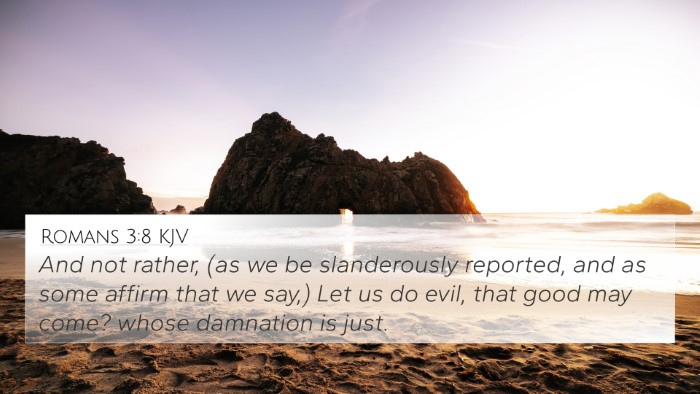Understanding Jeremiah 40:16
Verse: Jeremiah 40:16 - “But Gedaliah the son of Ahikam said unto Johanan the son of Kareah, Thou shalt not do this thing: for thou speakest falsely of Ishmael.”
Comprehensive Analysis of Jeremiah 40:16
This verse occurs in a narrative concerning the significant political and social upheaval following the Babylonian conquest of Jerusalem. It highlights the tension between Gedaliah, the appointed governor, and Johanan, who expresses distrust towards Ishmael and his intentions. This moment encapsulates themes of leadership, trust, and the struggle for control in post-exilic Judah.
Insights from Public Domain Commentaries
Matthew Henry’s Commentary
Henry elaborates on the importance of Gedaliah’s authority and his role as a stabilizing figure amid chaos. He notes that Gedaliah’s calm assurance is crucial during this tumultuous period. The hesitation expressed by Johanan is significant, illustrating the challenges Gedaliah faces in fostering unity. Johanan's accusations towards Ishmael serve as a warning about potential betrayal, highlighting the perilous atmosphere post-exile.
Albert Barnes' Notes on the Bible
Barnes emphasizes that Gedaliah's defense against Johanan’s concerns reflects his intention to maintain peace. He notes that Gedaliah’s assertion that Johanan speaks falsely indicates a focus on unity and trust, essential for the survival and restoration of the Jewish community in Judah. This moment serves as a demonstration of Gedaliah's leadership and commitment to a peaceful resolve, despite the underlying threats.
Adam Clarke’s Commentary
Clarke sheds light on the historical context of the individuals involved. By analyzing the character of Ishmael, he suggests that Gedaliah’s insistence on trust is rooted in a broader theological understanding of providence and the divine will. The confrontation between Johanan and Gedaliah exemplifies the broader struggles faced by returning exiles as they navigate relationships amidst fear and political intrigue.
Thematic Connections
This verse can be understood in relation to various themes present throughout Scripture, particularly within the context of leadership and divine protection.
Cross-References
- Jeremiah 39:14: The context of captivity and the struggles faced by the Jewish people.
- Jeremiah 41:1-3: The narrative following this verse provides insight into the actions of Ishmael.
- 2 Kings 25:22: Discusses the fate of the people left behind in Judah and their governance.
- Isaiah 41:10: God’s assurance against fear, reflecting on leadership during crises.
- Ezekiel 34:23-24: God's promise of appointing a shepherd for His people, connecting to Gedaliah's role.
- Psalm 27:1: The theme of trust in God amid adversity resonates with Gedaliah's call for peace.
- Matthew 10:16: Jesus’s teachings on wisdom and caution among wolves echo Johanan's distrust.
The Importance of Cross-Referencing
Understanding Jeremiah 40:16 benefits significantly from cross-referencing other Scriptures. The themes of leadership, conflict resolution, and trust recur throughout the Bible, establishing a foundation for deeper understanding.
Exploring Cross-References
Utilizing tools for Bible cross-referencing, such as a bible concordance or bible cross-reference guide, can greatly aid in uncovering connections. For example,:
- How to find cross-references in the Bible: look for keywords and thematic links.
- Identifying connections between Old and New Testament: observe how themes like trust and leadership are treated.
- Cross-referencing Psalms with New Testament teachings: provides insight into the continuity of God's protective promises.
Conclusion
Jeremiah 40:16 serves as a vital verse for understanding the dynamics of post-exilic leadership and community relationships. By cross-referencing related passages, one can appreciate the multifaceted nature of trust and authority present in the Scriptures. Themes of divine protection and leadership resonate throughout the Bible, offering a rich tapestry for further exploration.





